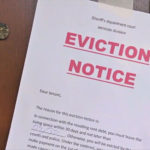A reference of Florida Eviction Laws, and steps of the Florida eviction process for landlords and renters, updated 2021.
- What are the reasons that landlords can evict tenants under Florida eviction laws?
- Nonpayment of rent (Fla. Stat. Title VI. § 83.56(3)).
- Material non-compliance with the lease agreement (Fla. Stat. Title VI. § 83.56(2)).
- The tenant remains in possession of the dwelling unit after the occupancy period without the landlord’s permission (Fla. Stat. Title VI. § 83.57).
- What notice do Florida eviction laws require that landlords provide tenants before starting the eviction process?
- For evictions based on non-payment of rent, the landlord must give a 3-day notice to the tenant before starting the eviction process. The three days do not include weekends or legal holidays. The eviction notice must state that the tenant owes rent, that the landlord demands payment of the late rent, that the tenant has three days to pay rent and the date by which rent must be paid. (Fla. Stat. Title VI. § 83.56(3)).
- For evictions based on material lease violations, the landlord must give a 7-day notice of non-compliance.(Fla. Stat. Title VI. § 83.56(2). If the violation is of a nature that it can be remedied, such as having unpermitted pets, guests, or vehicles, parking in an unpermitted area, or failing to keep the premises clean and sanitary, the tenant must be given an opportunity to fix the problem. (Fla. Stat. Title VI. § 83.56(2)(b)). The notice must state the violation, that the tenant must fix the problem within 7 days, and that if the tenant does not fix the problem within this timeframe, the tenant will need to vacate the rental unit. If the tenant commits a violation of the same nature within the 12 months following notice, the landlord can move forward with eviction without any requirement of additional notice. (Fla. Stat. Title VI. § 83.56(2)(b)). If the violation is of a nature that cannot be remedied, such as misusing, damaging, or destroying the landlord’s or other tenants’ property, the landlord can terminate the lease immediately, and the tenant will have 7 days to vacate the unit. (Fla. Stat. Title VI. § 83.56(2)(a)). The notice must state that the lease is being terminated effective immediately, the tenant has 7 days to vacate the premises, and the reason for the lease termination. (Fla. Stat. Title VI. § 83.56(2)(a)).
- For evictions based on a holdover tenancy, the notice the landlord must provide depends on the length of the original lease. landlords must provide a 60-day notice to end the tenancy. (Fla. Stat. Title VI. § 83.57). For a weekly tenancy, the landlord must provide a 7-day eviction notice. For a month-to-month tenancy, the landlord must provide a 15-day eviction notice. For a quarterly tenancy where rent is paid every three months, the landlord must provide a 30-day eviction notice. For a year-to-year lease in which the tenant pays a year of rent, the landlord must provide a 60-day eviction notice.
- Do Florida eviction laws allow landlords to use “self-help eviction” methods, such as locking a tenant out of the rental unit or shutting off the utilities?
- No. Florida law forbids landlords from using self-help eviction methods. Violating this law can result in the landlord owing the tenant actual and consequential damages or three months’ rent, whichever is greater. Additionally, the landlord can be required to pay legal costs, including attorney’s fees. (Fla. Stat. Title VI. § 83.67).
Eviction Process in Florida
Here are the seven steps that landlords must comply with to evict a tenant in Florida:
- Serve Written Notice on the Tenant The landlord must serve the appropriate eviction notice to the tenant that states the reason for eviction, the time limit to fix the issue, if applicable, and other information required by law. The notice must be given directly to the tenant through personal delivery or mail. If the tenant is not at the property, a copy must be left at the residence. (Fla. Stat. Title VI. § 83.56(4)).
- File Court Documents. The eviction process in Florida officially begins once the landlord files certain documents with the court. This is called an Action for Possession in Florida. The landlord files a Complaint for Eviction or a Complaint for Eviction and Damages if the tenant failed to pay rent. If the eviction is for another reason, the landlord files a Complaint for Eviction for Breach of Rental Agreement. The landlord also files a Summons, which notifies the tenant of the case and says when the tenant must respond to it. Complaint for Eviction for Breach of Rental Agreement: Asks the court to evict tenants for reasons other than failing to pay rent. Filed after the non-compliance eviction notice period has lapsed. These documents are filed with the court clerk in the county where the property is located.
- Deposit Rent Money with the Court. If the landlord accepted partial rent from the tenant after knowing that the tenant was not compliant with the lease, the landlord must do one of the following:
- Provide the tenant with a receipt stating the date and amount of rent received and the date and balance of rent due that the tenant can pay to avoid an action for possession.
- Place the rent that was accepted into the registry of the court after filing the action for possession.
- Post a new 3-day notice reflecting the current amount due. (Fla. Stat. Title VI. § 83.56(5)(a)).
- Wait for the Tenant to Respond. The tenant can file a written answer to the complaint and file it with the court. If the tenant wishes to fight against the eviction, they must deposit the unpaid rent with the court. (Fla. Stat. Title VI. § 83.60 (2)).
- File for Default Judgment or Attend the Court Hearing If the tenant does not fight the eviction, the landlord must submit a Motion for Clerk’s Default – Residential Eviction and for Damages, if applicable. The landlord must also file a Nonmilitary Affidavit that states the tenant is not a military member. If the tenant does respond, the landlord and tenant will attend the court hearing and present their case to the court.
- File for a Final Judgment. If the tenant did not challenge the case, the landlord files a Motion for Default Judgment – Residential Eviction and Damages, if applicable. The landlord also prepares and Affidavit for Damages with these documents. The landlord also prepares a Final Judgment – Eviction and Damages for the judge to sign.
- Get the Court Clerk to Sign a Writ of Possession. The landlord will need the court clerk to sign a Writ of Possession, which gives the local sheriff’s office the legal authority to forcibly remove the tenant.
- Have the Sheriff’s Office Serve a Writ of Possession. The sheriff can serve the writ of possession on the tenant. The tenant has 24 hours to vacate the property. If they refuse, the sheriff can forcibly remove them after 24 hours and the landlord can then reclaim the property.







